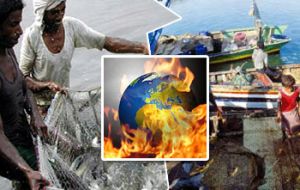MercoPress. South Atlantic News Agency
FAO suggests climate change talks should include fisheries
 Over 500 million people in the world depend on fisheries and aquaculture (Photo FIS)
Over 500 million people in the world depend on fisheries and aquaculture (Photo FIS) Sixteen international organisations asked that the protection and optimisation of marine ecosystems, fisheries and aquaculture be included in the discussions leading up to the sequel to the Kyoto Protocol.
In anticipation of the United Nations Framework Convention on Climate Change (UNFCCC) talks, a policy brief was issued by the Food and Agriculture Organisation (FAO) stating that about 520 million people – 8% of the global population - that is, fishers, farmers and coastal residents, depend on fisheries and aquaculture as a source of protein.
As a result, climate change may have deleterious effects on their lives due to shifting fish stocks, rising waters, unhealthy conditions that may put their livelihoods and/or health at risk.
Over-fishing and damaged marine ecosystems in addition to rural underdevelopment, poverty and pollution jeopardise the already fragile wellbeing of fishing and coastal villages worldwide. Climate change will exacerbate these problems unless immediate steps are taken to alleviate the impending threats.
Of these 520 million people, 400 million depend on fish for sustenance. Climate change has already begun impacting the distribution and reproduction of fish stocks throughout the oceans, affecting these communities’ access to fish as a food source.
The policy was issued by FAO, the Secretariat of the Pacific Community (SPC), the United Nations Environment Programme (UNEP), the World Bank, the World-Fish Centre and 11 more organisations.
“Our aim here is to ensure that climate change negotiators and decision makers in their deliberations don't forget our freshwaters, seas and oceans and those who depend on them,” said Kevern Cochrane of FAO's Fisheries and Aquaculture Department.
“They must address these aquatic environments and the fishing, aquaculture and other coastal communities whose livelihoods and even survival will be threatened by climate change. Through their decisions and actions, they need to avoid policies that would damage already stressed aquatic resources and human lives and, instead, implement measures that take full advantage of the environmental and food security services that healthy aquatic resources offer.”
The brief proposes adopting green and fuel-efficient fishing and aquaculture practices; eliminating subsidies that encourage over-fishing; assessing local vulnerabilities and risks; constructing local-level ocean climate models; boosting knowledge of the dynamics of biogeochemical cycles, particularly of carbon and nitrogen, in aquatic ecosystems; evaluating carbon sequestration in marine ecosystems; and implementing thorough and integrated ecosystem approaches to managing oceans, coasts, fisheries and aquaculture’s adaptations to climate change and how to reduce risk from natural disasters.
Marine ecosystems like mangroves, wetlands and coral reefs also serve as a buffer between coasts and violent storms such as hurricanes, foreseen to become more extreme as global warming progresses.
It is necessary to conduct research and determine the biological and chemical processes of these ecosystems plus the adaptation potential of the coastal communities in peril.
The partnership is collaborating to efficiently request that government delegates stress these issues at the UNFCCC meeting in Bonn, Germany next week. Millions of fishers, fish farmers and coastal inhabitants will see their livelihoods compromised due to climate change. (FIS).




Top Comments
Disclaimer & comment rulesCommenting for this story is now closed.
If you have a Facebook account, become a fan and comment on our Facebook Page!